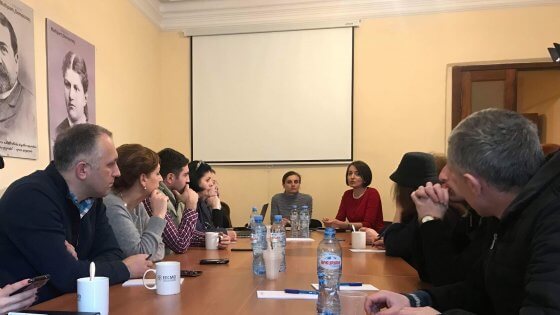Public Broadcaster Ajara TV and Radio, an important and interesting media platform today, is often at the centre of debates and discussions. Questions often arise in relation to its future, the ways of going forward and the challenges the regional broadcaster faces. The process of acquiring full editorial independence that started in the broadcaster is successful, while media experts and citizens often draw attention to Ajara TV’s role as the disseminator of an objective and unbiased information.
However, at the same time, the broadcaster face many problems and challenges, and is in the need of developing into a multifunctional media platform. To facilitate discussions on these issues of public interest, EECMD’s Batumi Democracy School has organized a meeting, which has been attended by the director of Ajara TV, acting head of advisory council of the broadcaster, former and current employees of the broadcaster, civil society representatives, journalists and democracy school students.
As the meeting participants noted, although the broadcaster does not face the challenge of free speech today, it faces a variety of problems that need to be effectively addressed in order to achieve the development of the media company. The former employee of Ajara TV, Natia Zoidze, who is now a regional representative of “Transparency International Georgia” remarked that the lack of professionalism is the major challenge of the broadcaster. Zviad Elizian, the manager of Batumi International Art-House Film Festival (BIAFF), put an emphasis on the informational-only aspect of Ajara TV as well as on the lack of its programmatic and creative development.
The representatives of Ajara TV, on the other hand, discussed the problems that are most felt by the TV and radio. The issue of limited funding stood out. According to the law, the budget of Public Broadcaster Ajara TV shall be no less than 15% of the budget of Public Broadcaster of Georgia. Increasing the number of percentage has been under discussions already for years, albeit due to the opposition from the advisory council of the Georgian Public Broadcaster the progress has not been achieved.
The advisory council representatives drew attention to the issue of employees’ labor rights, in particular the issue of safety at work as well as unstable contracts and low wages.
The developments around Radio Free Europe/Radio Liberty have also been discussed during the meeting. The director of the broadcaster, Natia Kapanadze, remarked that the success of Ajara TV is very much linked with the placement of RFE/RL program on the broadcaster. She hoped that the changes in the radio would not affect the cooperation between Adjara TV and RFE/RL.
Other interesting ideas and suggestions have also been explored during the meeting. For instance, the issue of having political talk shows and other analytical programs on the public broadcaster. The programs that are dedicated not only towards identifying the problem, but also discuss the solutions and include the decision makers in the process. It has been also outlined that the public broadcaster shall take up the function of an educator and create relevant educational programs.
During the discussion, TV management expressed their readiness to create public consultation groups. Nata Imedaishvili, acting head of the advisory council, remarked that apart from the fact that creating public advisory council is required under the law, it also helps the management to identify interests of population and set the priorities accordingly. She further noted that meeting at Batumi Democracy School is one of the forms of public engagement and that the discussions of such nature are vital to the development of the broadcaster.
